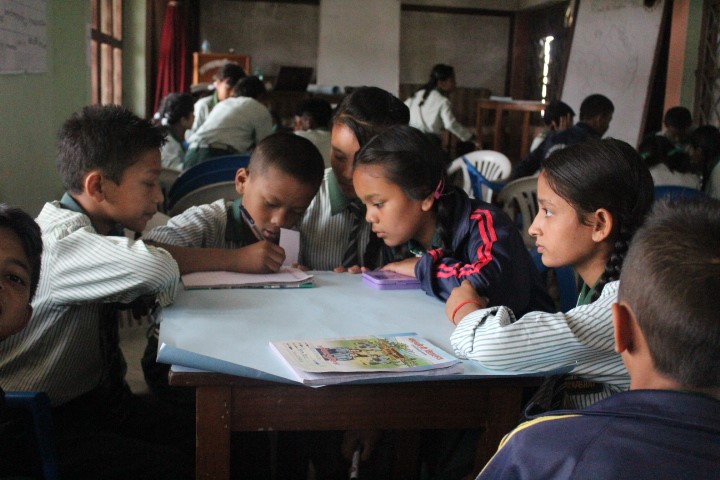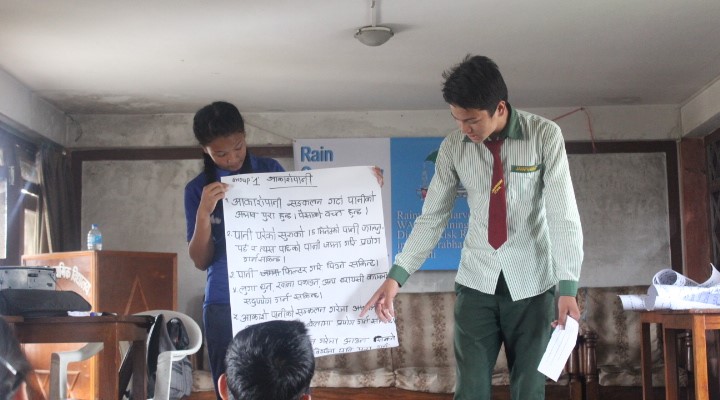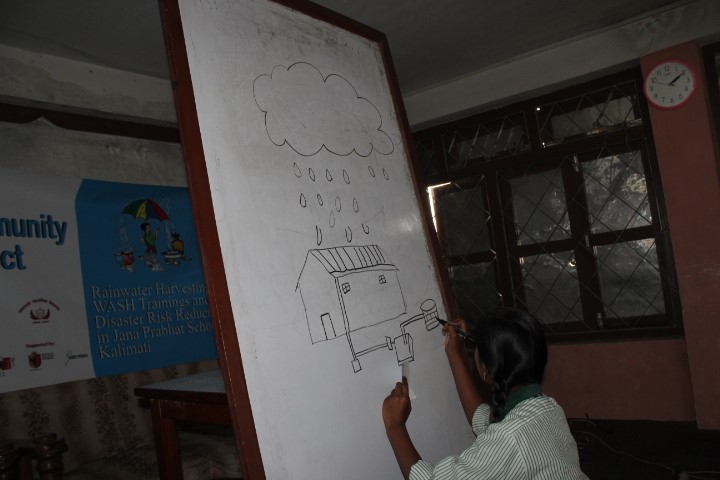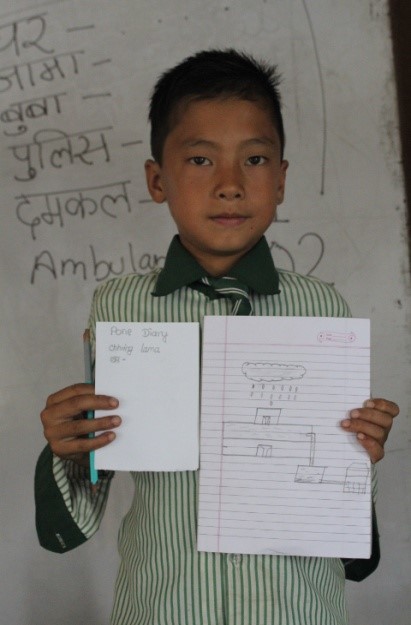July 2, 2017, Manashree Newa | Children are the future.
Giving them right knowledge at a young age can bring remarkable changes in their behavior. This thought kept in mind, we conducted a series of Training Sessions on Rain Water Harvesting (RWH), Water Sanitation and Hygiene (WASH) and Disaster Risk Management (DRM) at Jana Prabhat School in June 2017. Since RWH system is going to be installed in the school, it is important that all the students are aware about its components and other factors involved with it. So, the main objective of the training sessions was to make students familiar about RWH, WASH practices and disaster preparedness.

In order to ensure that our message reached all students effectively, each grade was given a separate session with an average of 35 students in each session. A total of 286 students attended the training sessions.
Students from grade 6 to 10 were given presentations, shown informative videos and involved in interaction and group works. Throughout the program, the students were attentive and inquisitive about the new things they were learning. Some of them shared how they were harvesting rain water at their houses. They were basically storing the rain water in bucket and drums for use in laundry and cleaning purposes. But after learning that the rain water can be collected in systematic manner and used for diverse purposes after filtration, they all agreed to share this knowledge with their parents, neighbors and relatives.
For the group work, students were divided into four groups and given separate topics to present on. The topics were created such that the understanding levels of the students could be reflected. It was clearly observed that the higher grade students presented with broader ideas and understandings. Bibeksheel Thagunna of grade 10 related RWH with Disaster Preparedness by saying “If we harvest rain water, it can be used in case of emergency like fire accident.”


Students involved in group activity. Students presenting their group work.
The students from grade 9 and 10 were given Pre-Test and Post-Test to analyze the level of change in understanding before and after the training session. The test result showed that the performance of children improved from an average of 75% to an average of 90%. There were marked improvements in the issues of water availability, use and components of rain water harvesting, importance of hand washing and disaster. In the field of disaster alone, there was an improvement from 38% correct answers to 84% correct answers, showing an overall expansion of knowledge. However, it was also observed that the students lack knowledge on menstrual hygiene.
A different approach was implemented on grade 1 to 5 considering their young age and shorter attention span. The students were shown more videos on all three matters and involved in interactive games. The students were made to draw components of RWH system to make a full system and then asked to explain it. In order to make WASH learning an interesting one, cards with pictures of bad habits and its corresponding good habits were distributed. The students were then asked to find their pair and explain the WASH behavior.


A girl from class 3 completing the drawing of RWH system. Chiring Lama of class 4
showing his Emergency Phone
Diary and his drawing of RWH system.
For DRM, the students were guided to make an Emergency phone diary which consisted their blood group and phone numbers of their Parents, Police, Ambulance, Fire Brigade, and Bir Hospital. The main objective was to make them realize that it is important to memorize their blood group and the emergency phone numbers.
The students were very happy to have attended the training. “We learned many things in a fun way. We came to know that rain water can be properly harvested. In doing so, the places which have severe scarcity can get the surplus water we were using” said Manita Thapa of grade 7. Kushal Mallik of grade 9 said, “I found the training session very good because we students got to know that the rain water which is being wasted can be stored and used for various purposes.”
Even the teachers were satisfied with the training. When asked if the training is hampering the student’s school schedule, Mr. Shiva Hari Manandhar, the Vice Principal said “They are not missing classes, rather they learning new and beneficial things that only books could not have given." A primary level teacher at the school said, “I always wanted to teach students in such interactive way and teach not just from the books, but also the basic things like sanitation and hygiene. But the school system here is not so flexible. This training fulfilled what I have always wanted to do. So I really appreciate your work.”
Thus, the training sessions were very interactive and productive. It gave the students an opportunity to open their eyes towards something very important but ignored for long. The students at Jana Prabhat School either work at households to earn a living or they belong to low-income family. So, considering their lifestyle and living environments, the knowledge from this training will be very useful in improving their quality of life.